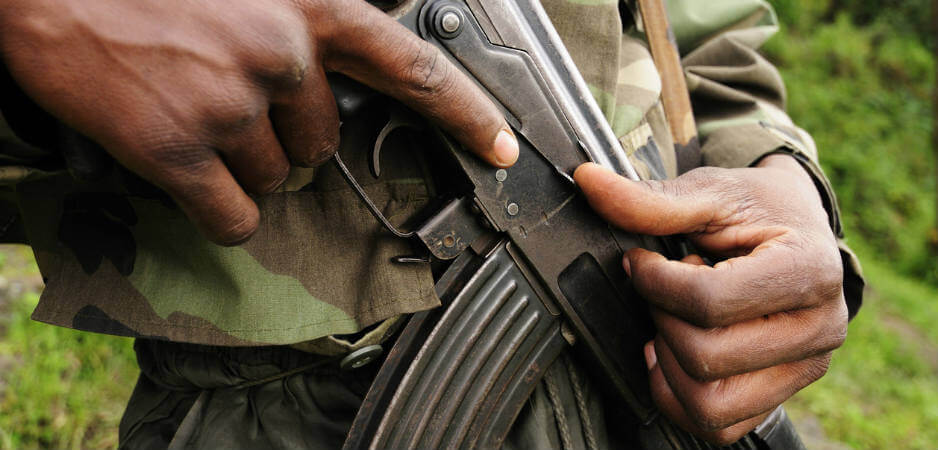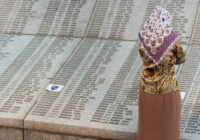Just how much can the country take before unravelling?
Congolese security forces and a militia battling them have killed more than 3,000 people in the central province of Kasai since October 2016, according to a staggering new report from Congo’s Catholic Church released on June 20. The report is the most detailed account of the violence in Kasai, painting a picture of near complete devastation: 20 villages have been “completely destroyed,” nearly 4,000 houses razed, and 34 houses of worship damaged or shut down. At the same time, a report by UN human rights chief Zeid Ra’ad Al Hussein details the Democratic Republic of Congo’s harrowing human rights situation that was discussed at a meeting of the UN Human Rights Council (HRC) in Geneva.
The only bright side is that the reports seem to have finally spurred the international community to take more decisive action on Congo. Three days after Al Hussein’s speech, the HRC adopted a resolution to send a team of experts to investigate human rights abuses in Kasai. The Congolese government agreed to cooperate, though under the condition that the UN experts limit themselves to technical assistance, leaving the investigation under Congolese command. While far from ideal, it’s a first step. The deadly mix of localized violence combined with a brewing national political crisis means the DRC is on track to becoming once again Africa’s tinderbox, steadily imploding and drawing neighboring countries with it — that is, unless the international community takes more drastic action.
While the Syrian refugee crisis dominates international headlines, more than 922,000 Congolese citizens fled their homes in 2016 — the highest number of internally displaced resulting from conflict around the world. According to the latest report by the Internal Displacement Monitoring Centre, political insecurity has exacerbated long-simmering tensions and armed conflicts, especially in the North and South Kivu provinces in eastern DRC. These regions have long been hotbeds of unrest due to high population density, resource-driven conflict and intermittent interference by actors from neighbouring Rwanda and Uganda. And now, the outbreak of violence in Kasai has only made matters worse. Between 1997 and 2016, the region accounted for only 3.6% of all violent incidents rocking the country — in the last five months of 2016 that figure grew threefold. It’s no surprise that out of the 3.7 million people who have been displaced in total, 1.3 million are from Kasai.
If at first sight the crises in the Kivu and Kasai provinces seem containable on their own, in reality they are actually much more severe than they appear. Violence first erupted in 2016, when a local tribal leader rising up against Congolese President Joseph Kabila was killed during clashes with government troops. The uprising followed an agreement signed between Kabila and the opposition, allowing the president to stay in office beyond the end of his term in December 2016, provided he called elections by the end of 2017. This, however, seems increasingly unlikely. Losing his position would mean that it’s not only Kabila’s vast, ill-gotten fortune that’s at stake, but quite possibly his liberty too. Unsurprisingly, Kabila is engaging in glissement — delaying elections to give himself a chance to achieve a constitutional coup or at least find a compliant successor. Some even suggest that Kabila is deliberately inflaming the situation in Kasai, the stronghold of the opposition movement, in order to delay elections.
Unholy Mix
Faced with such an unholy mix of localized violence and political instability, what more can the international community do? To begin with, the HRC’s resolution to send investigators to Kasai was an important first step. But given the terms Kabila successfully forced onto the investigation, the United Nations has to ask itself the question of how it can engage the DRC in earnest. To have any impact, the UN should crack down on the mismanagement that led to the deaths of two experts who were sent to perform an investigation in Kasai. Furthermore, the UN would be well advised to arduously enforce its accusations that the army killed the UN experts and that Kabila is blatantly covering it up. Instead, it took nearly two months before the United Nations assembled a panel to investigate what went wrong, and the Security Council has yet to order a formal investigation.
In the meantime, there are other tactics the international community could use to force a political solution in the DRC. The European Union and the United States have already launched sanctions against several senior officials in Kabila’s government for “planning, directing or committing” serious human rights violations. However, there’s little hope for elections as long as the opposition is ailing without credible leadership. The EU and the US need to up the pressure on DRC by finding new areas for sanctions to coerce Kabila into letting the only credible opposition politician, Moïse Katumbi, back on Congolese soil.
Earlier this month, Katumbi filed a legal complaint with the UN Human Rights Committee, appealing for international protection when he returns from exile to run for president. The international community would be obliged to provide that protection upon his “imminent” return. Katumbi already possesses nationwide recognition and a solid record as former governor of Katanga province. He was forced into exile after facing politically motivated allegations of recruiting mercenaries, while he’s already been convicted on false accusations of real estate fraud. In the latest example of the government’s ludicrous efforts to disqualify him, the minister of justice claimed that Katumbi had Italian nationality and could not recover his Congolese citizenship.
Faced with this onslaught, Kabila has doubled down and started dishing out millions to Washington lobbying firms hoping to get the Trump administration on his side. According to recent reports, the country signed a $5.6 million contract with Mer Security and Communication Systems, as well as a separate $45,000/month retainer with the Livingston Group. The purpose? Organizing events with Washington insiders and vaguely-worded “advisory services.” At the same time, Kabila is still claiming with a straight face that the DRC doesn’t have money to host elections.
The fact that Kabila has thus far been able to walk away relatively unscathed from the international response highlights the need for new avenues for targeted action. For Congo to find peace, Europe, the US and the UN need to do everything in their power to show Kabila that he won’t get away with his crimes.
The views expressed in this article are the author’s own and do not necessarily reflect Fair Observer’s editorial policy.
Photo Credit: RollingEarth
Support Fair Observer
We rely on your support for our independence, diversity and quality.
For more than 10 years, Fair Observer has been free, fair and independent. No billionaire owns us, no advertisers control us. We are a reader-supported nonprofit. Unlike many other publications, we keep our content free for readers regardless of where they live or whether they can afford to pay. We have no paywalls and no ads.
In the post-truth era of fake news, echo chambers and filter bubbles, we publish a plurality of perspectives from around the world. Anyone can publish with us, but everyone goes through a rigorous editorial process. So, you get fact-checked, well-reasoned content instead of noise.
We publish 2,500+ voices from 90+ countries. We also conduct education and training programs
on subjects ranging from digital media and journalism to writing and critical thinking. This
doesn’t come cheap. Servers, editors, trainers and web developers cost
money.
Please consider supporting us on a regular basis as a recurring donor or a
sustaining member.
Will you support FO’s journalism?
We rely on your support for our independence, diversity and quality.






